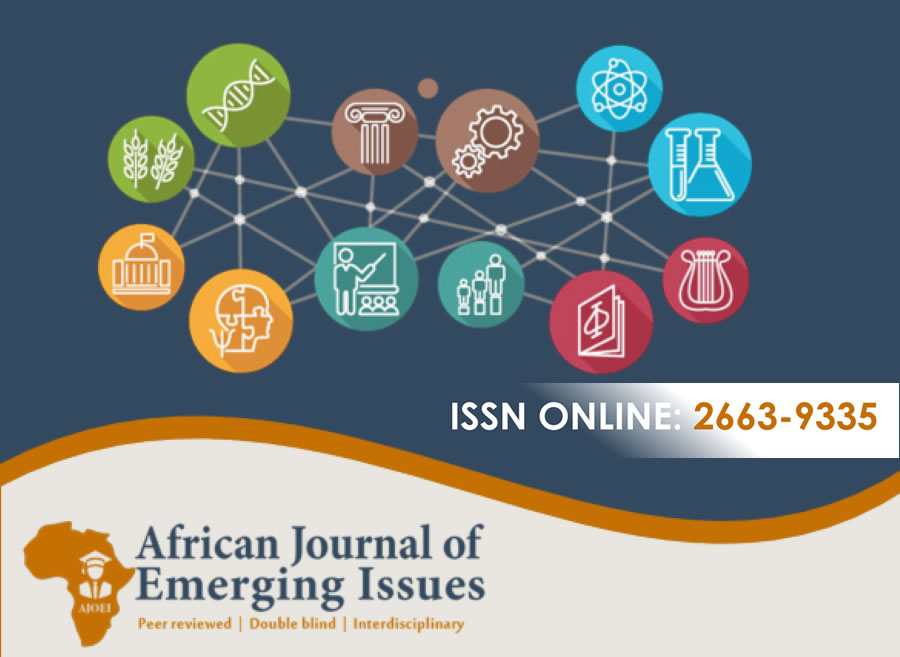THE MODERATING EFFECT OF FINANCIAL LITERACY ON THE RELATIONSHIP BETWEEN WOMEN ENTERPRISE FUND UTILIZATION AND PROFITABILITY OF THE WOMEN-OWNED ENTERPRISES IN KAJIADO COUNTY, KENYA
Abstract
Women-owned enterprises globally face persistent profitability challenges despite receiving financial support from government programs. This study investigated the moderating effect of financial literacy on the relationship between Women Enterprise Fund utilization and profitability of women-owned enterprises in Kajiado County, Kenya. Anchored on Financial Literacy Theory, the study adopted an explanatory research design with 381 respondents selected through stratified random sampling, achieving a 72.4% response rate. Data were analyzed using descriptive statistics, correlation analysis, and Hayes' Process Macro Model 1. Results revealed strong positive correlations between loan amount utilization (r = 0.899), repayment period (r = 0.898), savings (r = 0.930), and profitability. The moderated model explained 90.21% of profitability variance compared to 87.93% baseline. Financial literacy significantly strengthened the effects of loan amount (β = 0.493, p = 0.023) and savings (β = 0.587, p = 0.002) on profitability. The study concludes that financial literacy is a critical moderating variable determining the effectiveness of government financial interventions in promoting sustainable enterprise profitability. The study recommends that policymakers integrate comprehensive financial literacy training programs into fund disbursement processes, establish quarterly literacy campaigns through local forums, and develop mobile-based learning platforms to enhance women entrepreneurs' financial competencies in marginalized regions.
Keywords: Financial Literacy, Women Enterprise Fund, Profitability, Women-Owned Enterprises, Kajiado County
References
Akhtar, I. (2016). Research design. Social Research Foundation.
Andriamahery, A., & Qamruzzaman, M. (2022). Does access to finance, technical know-how and financial literacy offer women empowerment through women entrepreneurial development? Frontiers in Psychology, 13, 1–16.
Atkinson, A., & Messy, F. (2015). Financial education for migrants and their families. OECD Working Papers on Finance, Insurance and Private Pensions, No. 38.
Bank of Baroda. (2023). Government schemes for women entrepreneurs in India. Bank of Baroda.
Chiloane-Tsoka, G. E. (2020). Women in business: Exploring barriers to success from a South African perspective. Gender in Management: An International Journal, 35(3), 217–233.
Harrison, F., & Muiru, D. (2021). Effects of selected financial management practices on financial performance of commercial banks in Kenya. International Journal of Finance, 3(1), 17–38.
Hayes, A. F. (2013). Introduction to mediation, moderation, and conditional process analysis: A regression-based approach (3rd ed.). The Guilford Press.
International Finance Corporation. (2021). Women, business and the law 2021. World Bank.
Julius, S., & Rugami, M. (2021). Microcredit services and performance of women-owned enterprises in Kilifi County, Kenya. International Journal of Business Management, Entrepreneurship and Innovation, 2(4), 52–62.
Kariuki, J., & Wambui, S. (2022). The impact of support programs on women-owned MSMEs in Machakos County. Journal of Small Business and Enterprise Development, 29(4), 673–688.
King'ola, R., & Njeru, A. (2018). Challenges facing the performance of women entrepreneurs in small and medium enterprises within Kajiado County. The Strategic Journal of Business and Change Management, 5(3), 283–302.
Kiyosaki, R. (2000). Rich dad poor dad. Warner Business Books.
Lusardi, A. (2009). Financial literacy and the need for financial education: Evidence and implications. Journal of Economics and Finance, 43(1), 2–8.
Lusweti, J. (2021). Influence of microfinance services on the performance of women-led businesses in Busia County. International Journal of Business Strategy, 6(2), 45–60.
Mallik, G., & Singla, A. (2021). Determinants of financial literacy: Empirical evidence from micro and small enterprises in India. Asia Pacific Management Review, 26(3), 145–155.
Mandell, L. (1990). Financial literacy and personal finance. Journal of Financial Education, 2(1), 15–22.
Mandell, L., & Lynch, L. (1990). Consumer financial decision-making and financial literacy. Journal of Consumer Affairs, 24(1), 45–60.
Munuve, A., Githui, T., & Omurwa, J. (2020). Effects of microfinance services on the performance of women-based enterprises in Kenya: A case of Ongata Rongai. African Journal of Emerging Issues, 2(1), 1–12.
Mutua, E., & Muriithi, J. (2023). Performance and profitability of women-owned MSMEs in Nakuru County. African Journal of Business Management, 17(1), 123–139.
Ngugi, I., & Mungai, D. (2021). Impact of Women Enterprise Fund on MSME performance in Kenya. Journal of Financial Economics, 15(4), 67–84.
Ngure, M., Mungami, S., & Njangiru, M. (2020). Financing cost effect on financial performance of micro, small and medium enterprises in Starehe, Nairobi City County, Kenya. International Journal of Business Management, 4(2), 1–15.
Nyamboga, T., & Ali, A. (2020). Kenya Women Trust Fund and its impact on women entrepreneur's performance. International Journal of Business and Social Science, 11(2), 60–75.
Nyandieka, L. (2022). Access to financial resources and implementation of women-owned income-generating projects in Ongata Rongai, Kajiado County (Master's thesis). University of Nairobi.
Tumba, N., Onodugo, V., Akpan, E., & Babarinde, G. (2022). Financial literacy and business performance among female micro-entrepreneurs. Investment Management and Financial Innovations, 19(2), 157–167.
U.S. Small Business Administration. (2024). The SBA emphasizes the importance of financial literacy. U.S. Small Business Administration.
Wangui, M. (2020). Impact of financial literacy on the advancement of women's groups in Kenya. Journal of Economics and Finance, 11(2), 1–12.
Wanjama, L., Okwema, P., & Nyamagwa, R. (2022). Impact of financial literacy on economic empowerment of small-scale women traders in Kisii County. International Journal of Advanced Research and Review, 7(3), 1–15.
Women Enterprise Fund. (2025). Beneficiary data for Kajiado County (2018–2022). Women Enterprise Fund Headquarters.
Wombo, D., Ogaga, E., & Tsetim, J. (2020). Effect of microfinance institution services on the performance of women-owned small and medium enterprises in Benue State, Nigeria. East African Scholars Journal of Economics, Business and Management, 3(6), 123–135.
Yamane, T. (1967). Statistics: An introductory analysis (2nd ed.). Harper and Row.
Yasin, R., Mahmud, M., & Diniyya, A. (2020). Significance of financial literacy among women entrepreneurs on halal business. Journal of Halal Industry and Services, 3(1), 1–10.
Zvirikuzhe, C. (2022). The influence of microfinance institutions programs on women-owned small and medium enterprises (SMEs) development in Mashonaland West Province of Zimbabwe (Doctoral dissertation). Chinhoyi University of Technology, Zimbabwe.





